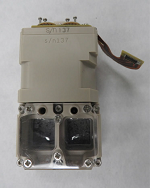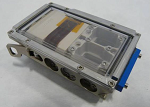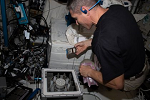BioAsteroid
|
|
Project Name: BioAsteroid Customer: University of Edinburgh Objective: A biomining experiment in space to investigate the effects of altered gravity in the interaction between microbes and rocks in a liquid medium. Description: The BioAsteroid experiment investigates how gravity affects the interaction between microbes and rock in a liquid medium. The results will help to develop future equipment to support the use of microbes and their interactions with rocks on the Moon (0.17 g), Mars (0.38 g) and on asteroids (micro-g). The latter have recently been identified as the prime target for extra-terrestrial biomining. Microgravity can be considered as an end-member condition to understand how mixing regimes such as convection currents change the three-component problem of the interaction of liquid, rocks and micro-organisms. BioAsteroid is expected to gain basic physical insights into this problem, with many future applications other than mining (for example in life support systems involving microbial components). The goal of the BioAsteroid experiment is to investigate the effects of altered gravity on the rock/microbe/liquid system as a whole. In particular, it will address questions on:
BioAsteroid is physically configured as a collection of small culturing devices with a substrate of meteoritic material on which the bacteria will be grown. It builds on the ESA BIOROCK experiment, which used the same hardware developed for ESA by Kayser. Two microbial species have been selected: Sphingomonas desiccabilis and Penicillium simplicissimum which will be uploaded in a desiccated, dormant state. The experiment shall be started in space by providing R2A liquid culture medium that provides organic food, oxygen and some minerals (the missing minerals are provided by the rock). The experiment shall be terminated in space by providing a chemical fixing solution to the cultures and returned to Earth. The BioAsteroid experiment was launched to the ISS in December 2020 using the BioReactor Express service and the KUBIK incubator.
|
|||||||||




